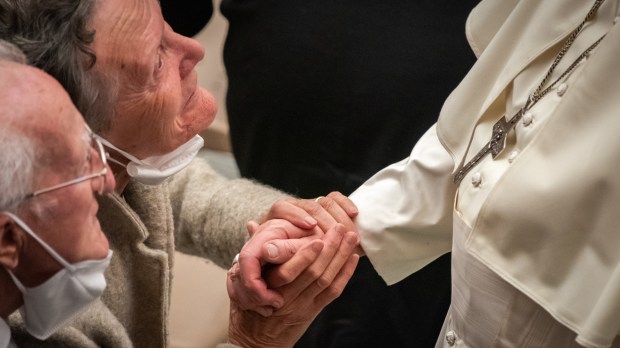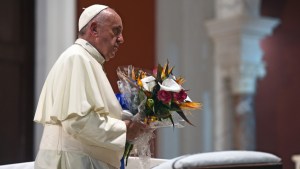“To caress an elderly person has the same hope as caressing a child, because the beginning of life and the end are always a mystery, a mystery that should be respected, accompanied, cared for. Loved.”
Pope Francis on February 9 took up the theme of death, as he continued his general audience catecheses on St. Joseph, who is honored as the patron of a happy death, “a devotion born of the thought that Joseph died cared for by the Virgin Mary and Jesus.”
“A century ago,” said Pope Francis, “Pope Benedict XV wrote ‘through Joseph we go directly to Mary, and through Mary to the origin of all holiness, who is Jesus.’ Both Joseph and Mary help us to go to Jesus.”
The pope from 1914 to 1922 went on to encourage devotion to Joseph as the patron of a happy death.
In the context of these reflections, P0pe Francis emphasized that assisted suicide and euthanasia are contrary to human dignity.
He briefly outlined principles of bioethics in this regard: that futile treatments should be avoided, and that palliative care should help the dying to experience their final days and moments “in the most human way possible.”
Two considerations stand for us Christians. The first: we cannot avoid death, and precisely for this reason, after having done everything that is humanly possible to cure the sick, it is immoral to engage in futile treatment (cf. Catechism of the Catholic Church, no. 2278). That phrase of the faithful people of God, of the simple people: “Let him die in peace,” “help him to die in peace”: such wisdom!
The second consideration concerns the quality of death itself, the quality of pain, of suffering. Indeed, we must be grateful for all the help that medicine endeavors to give, so that through so-called “palliative care,” every person who is preparing to live the last stretch of their life can do so in the most human way possible.
Help, not killing
Helping a dying person should not be confused with “unacceptable drifts towards killing,” the Pope emphasized.
We must accompany people towards death, but not provoke death or facilitate any form of suicide. I would point out that the right to care and treatment for all must always be prioritised, so that the weakest, particularly the elderly and the sick, are never discarded. Life is a right, not death, which must be welcomed, not administered. And this ethical principle applies to everyone, not just Christians or believers.
The Holy Father said that “accelerating the death of the elderly” is a “real social problem,” especially in regard to the elderly poor. He lamented when they are given fewer medicines than they need because they are poor. “This is neither human nor Christian.”
Please, do not isolate the elderly, do not accelerate the death of the elderly. To caress an elderly person has the same hope as caressing a child, because the beginning of life and the end are always a mystery, a mystery that should be respected, accompanied, cared for. Loved.
He concluded with a prayer that St. Joseph would “help us to live the mystery of death in the best possible way.”
For a Christian, the good death is an experience of the mercy of God, who comes close to us even in that last moment of our life. Even in the Hail Mary, we pray asking Our Lady to be close to us “at the hour of our death.”
Precisely for this reason, I would like to conclude this catechesis by praying together to Our Lady for the dying, for those who are experiencing this moment of passage through the dark door, and for the relatives who are experiencing bereavement. Let us pray together …


